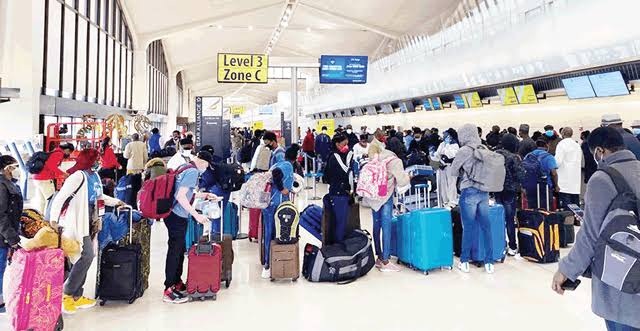As the japa trend sees youths flocking beyond the shores of Nigeria, to countries with polished standards and branches of possibilities, some students have confessed to certain financial hurdles experienced on the road to academic excellence.
Amaka, a master’s student in Ireland, relayed her story on the eye-opening reality bracketing the cost of living for international students abroad.
She cautioned future applicants to instil within themselves the quality of managing resources, as carelessness would lead to feeding from hand to mouth.
“I feel one skill international students have to learn is management, you need to learn how to manage because that is one of the major things that eats into our finances. That and rent. The rent is crazy!” she said.
Amaka shared that the cost of living is a major challenge for many international students who lack strong financial support. While they come for educational opportunities, they often confront high costs and strict regulations that can threaten their studies and financial stability.
Amaka describes the housing situation as a significant hurdle for international students.
“One of the challenges we international students face in Dublin is the accommodation crisis,” she says.
Landlords, she explains, are often reluctant to rent to students, believing they lack the ability to maintain a property. Even when students find housing, the rent is steep.
“I had to leave Dublin county to another county because living in Dublin was very expensive,” Amaka recalls.
In Dublin, monthly rents for a room range from €700 to €1,200, not including additional costs such as electricity, Wi-Fi, and waste management.
“When you end up getting that €1,000, and you remove €700, what you have left is €300, and out of that €300, you are still going to pay bills,” she explains.
The situation forces students to stretch their finances thin. With a legal limit of 20 working hours per week and a minimum wage of €12.70 per hour, students face an uphill battle.
“20 times €12.70 is €254. Even if you work full hours every week for four weeks, that amounts to about a €1,000 or so,” she says.
After paying rent and bills, students are left with little to cover other expenses, often leading to a cycle of financial struggle.
Amaka hammered on the inescapable reality of being resourceful, “First of all, looking at the exchange rate, how much will your parents give you to come here?
So by hook or crook, you have to find a student job. And coming as a student, you have a limit to the hours you can work. So in a week, you work just 20 hours,” she said.
Across the Atlantic, Izuchi, a student in the US, faces different yet similarly pressing financial challenges. “Gas prices have been high for a minute,” she notes, adding that groceries and school fees have also increased significantly.
“Two years ago, $100 in groceries lasted me longer, but now it only feeds me for a few days.”
Izuchi lamented that school fees have surged to $26,365 per semester, a stark increase from the $13,000 she previously paid with a scholarship.
“We were stripped of all our scholarships because of discriminatory policies,” she explains. “Even with a 3.75 GPA, I couldn’t get financial aid as an international student.”
Her living costs have also doubled, from $3,800 in January to about $6,000 now. “Just to wash your hair, you are charged $100. It’s outrageous,” she says.
This escalation in expenses, coupled with difficulty securing residency and work permits, complicates life for international students.
In the UK, Feyi’s experience reveals the financial balancing act required of students. “I can’t say how much I spend monthly because I think it’s over a thousand,” she says.
“I am about to rent an apartment, so that’s like a 1000 plus.”
She also noted the importance of saving, as such a habit would indeed prove rewarding “For me I think with savings you can start somewhere, especially as a student.”
In terms of finding a place to stay, she related that living alone would encourage more cost, especially with grocery shopping and handling of rent.
Feyi works part-time while volunteering, trying to manage her expenses. “It’s convenient for me because I am going to be on the cheaper side of the city,” she adds.
Despite her efforts to find affordable living and work opportunities, she still feels the pressure of balancing expenses and academics.
In Canada, Stella’s financial situation highlights another facet of the student struggle. Earning about $800 a month, she faces monthly expenses of around $1,000.
“I can’t work two jobs even if I wanted to, because students can’t work more than one job and also can’t work for more than 20 or 24 hours a week,” she explains.







